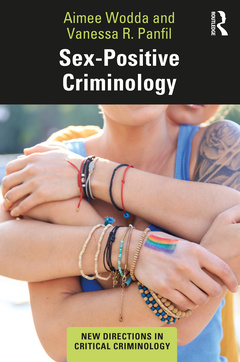Sex-Positive Criminology New Directions in Critical Criminology Series
Auteurs : Wodda Aimee, Panfil Vanessa

Sex-Positive Criminology proposes a new way to think about sexuality in the fields of criminology and criminal justice. Sex-positivity is framed as a humanizing approach to sexuality that supports the well-being of self and others. It is rooted in the principle of active and ongoing consent, and it encourages perspectives that value bodily autonomy, the right to access education, and respect for sexual difference. In this book, the authors argue that institutions such as prisons, schools, and healthcare facilities, as well as agents of governments, such as law enforcement, correctional officers, and politicians, can unduly cause harm and perpetuate stigma through the regulation and criminalization of sexuality.
In order to critique institutions that criminalize and regulate sexuality, the authors of Sex-Positive Criminology examine case studies exploring the criminalization of commercial sex and related harm (at the hands of law enforcement) experienced by those who sell sex. They investigate sex education in schools, reproductive justice in communities and institutions, and restrictions on sexuality in places like prisons, jails, juvenile detention, and immigrant detention facilities. They look into the criminalization of BDSM practices and address concerns about young people?s sexuality connected to age of consent and privacy violations. The authors demonstrate how a sex-positive perspective could help criminologists, policymakers, and educators understand not only how to move away from sex-negative frameworks in theory, policy, and practice, but how sex-positive criminological frameworks can be a useful tool to reduce harm and increase personal agency.
Written in a clear and direct style, this book will appeal to students and scholars in criminology, sociology, sexuality studies, cultural studies, criminal justice, social theory, and all those interested in the relationship between sexuality and the crimino-legal system.
Introduction Part One: Reducing Harm, Increasing Agency 1.Selling Sex 2.Institutional Violence Against Those Who Sell Sex 3.Sexual Education 4.Reproductive Justice Part Two: Decriminalizing Desire 5.Carceral Facilities 6.BDSM and Consent 7.Young People’s Sexual Identities and Behaviors Epilogue: Since We Started Writing This Book
Aimee Wodda is an Assistant Professor of Criminal Justice, Law and Society at Pacific University. Her research focuses on the intersection between institutionalized forms of harm and gender, sexuality, and the law.
Vanessa R. Panfil is an Associate Professor in the Department of Sociology and Criminal Justice at Old Dominion University. She is also the author of The Gang’s All Queer: The Lives of Gay Gang Members (NYU Press, 2017).
Date de parution : 09-2020
15.6x23.4 cm
Date de parution : 09-2020
15.6x23.4 cm
Thème de Sex-Positive Criminology :
Mots-clés :
LGBTQ Youth; Queer Criminology; Thick Desire; Feminist Criminology; Positive Sexuality Framework; Intersectionality; Sex Workers; Gender; Crime and Justice; Young Man; Sexual Offending; Holistic Sex Education; Deviance; Carceral Facilities; Deviant Behavior; Reproductive Justice; Critical Criminology; Consensual Sexting; Social Justice; LGBTQ Identity; Sexual Education; LGBTQ Sexuality; LGB; BDSM; Decriminalizing Sex Work; Sexual Identity; NHI; Law and Sexuality; Overburdens; Socio-Legal Studies; CSE Program; Gender and Sexuality; Teen Sexting; sex-positive perspective; Transactional Sex; criminal justice; Carceral Spaces; sex-positive criminological frameworks; BDSM Contexts; healthcare facilities; BDSM Participants; crimino-legal system; BDSM Communities; CSE; Sex Trafficking; BDSM Practices
